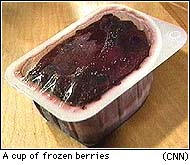 Packer
could face criminal felony charges, sources say
Packer
could face criminal felony charges, sources sayApril 2, 1997 - Web posted at: 2:05 p.m. EST (1905 GMT)
 Packer
could face criminal felony charges, sources say
Packer
could face criminal felony charges, sources sayIn this story:
LOS ANGELES (CNN) -- Schoolchildren in six states may have been exposed to the hepatitis A virus by eating contaminated frozen strawberries that were shipped to school cafeterias. The processor and packer of the berries could face criminal charges, sources told CNN.
| The affected
states include: |
| Arizona |
| California |
| Georgia |
| Iowa |
| Michigan |
| Tennessee |
The United States Department of Agriculture, which provides surplus food to school lunch programs, distributed the berries.
Initial reports indicated 16 states and the District of Columbia might have received tainted strawberries and had been asked to "put a hold" on the fruit.
But on Wednesday, the USDA and the Food and Drug Administration said only six states received berries believed linked to an outbreak in Michigan because all bore the same lot number. Those states, in addition to Michigan, are Arizona, California, Georgia, Iowa and Tennessee.
Nine other states and Washington, D.C., received shipments from the same company, but the berries bore different lot numbers, the agencies said. Those states are Florida, Illinois, Indiana, Maine, New Jersey, New York, North Carolina, North Dakota and Wisconsin.
The California Department of Health Services determined the strawberries were grown in Mexico, then frozen and processed by Andrew and Williamson Sales of San Diego last spring. The agency said the strawberries were shipped for bulk distribution to USDA-sponsored school lunch programs in December.
High-ranking sources within the USDA told CNN that Andrew and Williamson could be facing criminal felony charges for making false statements. The company's contract with the USDA states that the food must be U.S. grown and subject to continuous inspections, the sources said.
The company sold the berries to three vendors that supply the lunch program, a USDA official said. USDA agents are in San Diego investigating the case.
So far the only reported illnesses linked to the tainted berries are in Michigan, where about 150 students and teachers have been sickened, apparently after eating strawberries provided at lunch, federal authorities said Tuesday.
Iowa officials warned that about 300 of the state's schools may have served the fruit as recently as last week.
In Los Angeles, as many as 9,000 youngsters and adults may have been exposed. School and health officials determined that fruit cups served last week in 18 Los Angeles public schools may have been contaminated with the virus, Ruben Zacarias of the Los Angeles school system said.
As a precaution, health officials planned to begin offering immunizations later this week, said Dr. Helen Duplessis, the director of Los Angeles student health services. She noted there is typically a month-long incubation period.

|
Dr. Duplessis explains the
incubation and prevention of the hepatitis A virus
|
"We have already mobilized school nurses and county public health nurses," she said.
Meanwhile, Andrew and Williamson's parent company, Epitope Inc., said it recalled 13 lots of frozen berries shipped by Andrew and Williamson early in December 1996, shortly before Epitope acquired the company.
"The health and well-being of the public is Andrew and Williamson's foremost concern," Epitope president Adolph J. Ferro said in a statement.
Hepatitis A causes a mild liver infection and is spread through uncooked food. For most people, symptoms appear about 28 days after exposure. They include jaundice, fatigue, abdominal discomfort, vomiting, fever and dark urine.
| CNN's Senior Medical
Correspondent discusses hepatitis A
What causes hepatitis A... The cure... |

|
The elderly, the very young and people with weak immune systems are at risk of more severe symptoms.
The virus can be transmitted orally or through human waste, often by food handlers with poor personal hygiene, through undercooked shellfish from infected waters or through tainted water or ice.
The Centers for Disease Control said gamma globulin shots should prevent the disease in anyone who has eaten the fruit in the last 14 days.
![]()
Copyright © 2004 - 2022 - Ekim Notnud
-
All rights Reserved
This site is an unofficial historical site and not affiliated with Epitope, Inc.